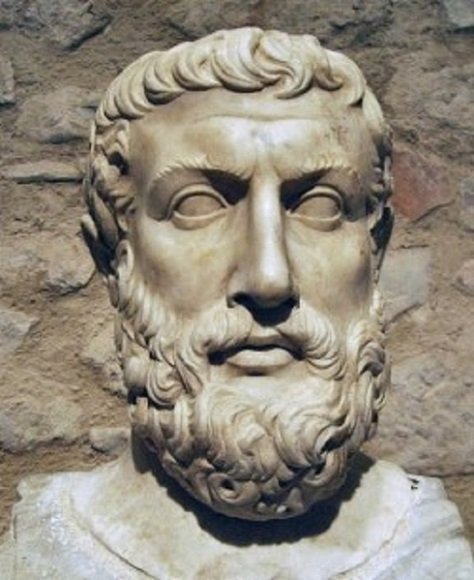Ancient philosophy. Eleatics School - Parmenides
Main representative of the Elite philosophical school is Parmenides. He originated from a prominent aristocratic family and was born around 540 in Eleia. According to a testimony preserved in Diogen Leartski, Parmenides was a listener to Xenophan, but he was not his direct student but was attracted to the philosophical activity of the Pythagoreans, in particular by some Amenius, but when Parmenides had, after his death, raised a tombstone of gratitude. Parmenides at all was dedicated to the secret of the Pythagorean society, as later his disciple Zeno. Both in the spirit of pigeoning took an active part in public life.
Parmenid was especially reported to have been a wise legislator, whose ordinance his citizens had sworn for many years. And as a person he was one of the most noble, lofty figures of antiquity. His way of life became a symbolic symbol of true nobility, integrity, depth. That is why Plato calls it "the Great Parmenides, who awakens blessing and honor, and who has an unattainable depth." His philosophical views, Parmenides, were put on a poem under the usual then title: Peri physeos. It is divided into two parts. Of the whole work in 19 fragments are preserved all 168 verses. Of them, a larger number is from the first part, which is believed to have been preserved around 9/10 and is particularly important, devoted to basic philosophical questions about the essence and quality of the true being. The other verses are from the second, less important part and less preserved part, dedicated to the question of the visible, volatile being. Since the same authors cite the same verses that have come to us, it is assumed that Parmenides' teaching has attained to us in its fullness. All the more, as he himself says, his basic philosophical idea is clear and simple and he from different countries, from different starting points, always returns to it.
In the introduction of its floral poem, resembling the introduction of Dante's Divine Comedy, Parmenides, in the form of allegory, tells of a trip with a beautiful chariot to the heavenly villages. Daughters of the sun guide the chariot and lead him from the kingdom of darkness-ignorance, deceit and falsehood to the curves of light, which is the true metaphysical knowledge, the knowledge of the essence of things. These two kingdoms are separated by doors, whose keys are kept by Dickie, the goddess of justice, that is, just by the path of justice, true knowledge is reached. In the beyond kingdom, he receives the goddess of the truth, and by taking his right hand he turns to him with a hello and promises to reveal to him both the true truth and the false human opinions. She warns him not to trust his eyes and ears, but to instill, explore and study false opinions, even though he is not true and unworthy of trust. Parmenides first reveals that there are two ways of knowing: knowing through the senses and knowing through thought. Our senses show and through them we perceive a variety of variable things, but this is not a true knowledge, because the very thing learned through the senses is not a true being. The true being is achieved only by the thought. Only reason can achieve the absolute truth, to perceive the very being, as it is in its essence: only thought can guess the eternal, lasting, immutable and real. And the thought is precisely what exists: we only think of the thing, the thing, and it would be the greatest nonsense and delusion to claim that we can think of something that is not, for the non-existent, of non-existence, because if we could think it, it is no longer our thought, it turns it into something that is so it gets beings.

In my opinion one who managed to pass his master. 👌 nice part.
Upvoted.
wow brother keep it up